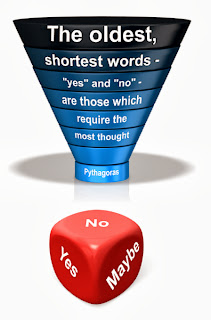The Positive Value of No
The power of no is overlooked far too often in regular communication as well as negotiations. There is often resistance to using no due to a lack of skills or misunderstanding of how to use no.
The importance of using "No" more effectively is often overlooked or misunderstood. In a "Yes or No" world, it is rarely appreciated just how there can truly be a positive value for "No." The ability to unlock the "Power of No" is likely to produce different outcomes in both business and personal situations. We can learn much from observing new approaches for using "No." The skills required to apply both "Yes" and "No" in a more effective fashion are described below.
Yes or No?
How can we get into so much trouble with two of the simplest words in the English language? Part of the problem can often be attributed to doubts as to whether either word represents the true answer.
- Did they really mean "No" or was that just a negotiating ploy?
- Did they say "Yes" just to avoid hurting someone's feelings?
- Is it possible that neither a "Yes" nor a "No" answer is appropriate?
Two of the best-known collaboration and communication experts who have weighed in on this sensitive and difficult topic are William Ury and David Walsh. They have each written a best-selling book about a different aspect of using "No" more effectively. Both books are featured in the following sections.
Business and Parenting Do Mix in This Case
William Ury's books are talked about often for their benefits in improving business communication, collaboration, and negotiation. However, his books have a direct relevance to family relationships and parenting as well. On the other hand, David Walsh's work is usually talked about in a parenting context, but his work can most definitely also be effectively applied in the business world. One of Dr. Walsh's best-known books (and it is discussed below) features follow-up studies and recommendations regarding the Marshmallow Test which was initially given to four-year old kids about 40 years ago.
Using No More Effectively
Literally for centuries, yes and no have been misunderstood on a frequent basis. It continues to surprise most of us that two-letter and three-letter words can be so hard to understand. If we were assembling a list of the most difficult words to understand, here are two words that I would certainly include in my top ten list:
- Yes
- No
There are different aspects to examine about the use of these words depending on the context in which they are being used. No matter whether we are talking about career, personal, political, or business uses of yes and no, it is generally agreed that there are many communication difficulties surrounding these words. With regards to raising children, there is a "Say Yes to No" parent education program to help reduce the difficulty of using no. When it comes to the world of business and government, we have regular prominent examples of people saying yes when they mean no and vice versa. If we include banks and bankers in the conversation, we will introduce even more complexities to the true meaning of yes and no in the banking world.
Most of us could probably use all of the help we can get when it comes to both communicating in general and the use of yes and no specifically. The authors and books described above are an excellent place to start learning more. For example, David Walsh has contributed a significant amount of new wisdom to using no more effectively in parenting communication. William Ury has written what is known as the "Yes and No Trilogy" (three separate books, each considered to be a masterpiece) to provide his expert insights. His books are likely to be helpful for both personal and business purposes.
A Closing Quote about "No"
- "A 'No' uttered from the deepest conviction is better than a 'Yes' merely uttered to please, or worse, to avoid trouble." (Mahatma Gandhi)
Recommended Books About "No"
Power of a Positive No by William Ury
This is the third in a trilogy of books that William Ury has written about the complexities of both "Yes" and "No." Each is an exceptional book for learning about two of the most fascinating words in the English language. The books can be read either together or separately. I heartily recommend all three. The first two books in his trilogy are "Getting to Yes" and "Getting Past No."
No: Why Kids of All Ages Need to Hear It and Ways Parents Can Say It by David Walsh
The Marshmallow Test is an integral part of David Walsh's approach to explaining how parents, teachers, and family members should change their thinking about the use of "No" with kids during their formative years. The book has become a core piece in an educational movement called "Say Yes to No" in several states. This program involves a coalition of parents, teachers, and other family members.


.png)
No comments:
Post a Comment